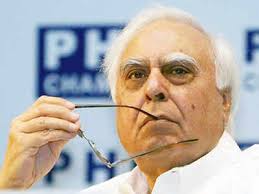Kapil Sibal: ‘Delhi Police did not do its job… What was the need for CJI to forward Justice Varma report to govt?’

Senior advocate and Rajya Sabha MP Kapil Sibal has openly questioned the Delhi Police’s conduct and the role of the Chief Justice of India in the Justice Yashwant Varma controversy. He raised concerns over the absence of due process and potential overreach in forwarding a confidential report to the government.
Burnt Cash, Unanswered Questions
Justice Yashwant Varma, a sitting Delhi High Court judge, found himself at the center of controversy after the discovery of burnt currency in his official residence. Sibal didn’t dispute the existence of the cash but raised red flags about how law enforcement handled the incident.
He asked pointed questions: Why didn’t the Delhi Police register an FIR immediately? Why didn’t they secure the location? Why was no effort made to trace the origin of the currency using serial numbers?
Sibal argued that these basic steps should have come first. “This isn’t how you deal with something so serious,” he said. “You don’t find burnt currency in a judge’s outhouse and just move on.”
Delhi Police: A ‘Failure of Duty’
Sibal criticized the Delhi Police for failing to act in a professional and transparent manner. According to him, no officer sealed the site or informed the judge’s family or staff. The Fire Services Department also remained silent. No forensic collection of evidence took place.
“This is not just neglect—it’s a complete breakdown of responsibility,” Sibal said. “If the judiciary is under scrutiny, law enforcement must uphold its highest standards.”
He demanded a proper criminal investigation. Without a registered FIR or preserved evidence, he warned that any conclusions would be incomplete and unreliable.
Internal Inquiry and the CJI’s Role
Following the incident, the Supreme Court formed an in-house committee. The panel, which included senior judges, examined the case and found Justice Varma’s conduct “seriously questionable.” The Chief Justice of India, Sanjiv Khanna, later forwarded this report to the Union Government.
Sibal strongly objected to this move.
“The in-house mechanism is meant for internal judicial review. Why was it sent to the government before a full investigation? That’s not procedure—it’s premature escalation,” he said.
He warned that such steps risk turning internal judicial issues into political matters. “You don’t involve the government until all facts are verified.”
Why an SIT is Needed
Sibal emphasized the need for a Special Investigation Team (SIT) to probe the matter impartially. “This case needs a neutral investigation. One that doesn’t rely solely on internal findings or media leaks,” he said.
He explained that impeachment procedures should begin only after a formal legal process, backed by clear evidence, has taken place. “Judges should not be punished based on half-baked inquiries or political pressure,” he said.
Comparing Two Cases: Varma vs. Yadav
Sibal also pointed to another case for comparison—Justice Shekhar Yadav of the Allahabad High Court. Justice Yadav allegedly made hate-filled remarks in court. Yet, no in-house investigation has started against him.
“How can one judge face an immediate report and impeachment, while another continues without scrutiny?” Sibal asked. “Are we using different rules for different people?”
He said the selective treatment sends a dangerous message. “Justice must be consistent. If it isn’t, we erode trust in the entire system.”
Judicial Independence at Risk
The bigger issue, Sibal argued, is not just about Justice Varma—it’s about preserving the independence of the judiciary.
“The Constitution lays down a process for handling these situations. If we ignore that, what stops future governments from targeting judges they dislike?” he asked.
Sibal added that public trust in the judiciary comes from its independence. Allowing the executive to interfere—especially without due process—sets a dangerous precedent.
Not Just Legal—But Moral
Sibal ended with a powerful reminder: “This isn’t just about the letter of the law. It’s about the spirit of justice.”
According to him, the damage caused by acting in haste or under pressure could hurt the judiciary more than any one incident.
Final Thoughts
The Justice Varma case has opened a larger debate on legal integrity, accountability, and the checks and balances within the Indian system. Kapil Sibal’s questions reflect concerns shared by many—lawyers, lawmakers, and citizens alike.
At its core, this issue is about how we handle sensitive allegations. Do we rely on swift, politically driven responses? Or do we pause, investigate properly, and act only after establishing the truth?
If India wants to preserve the credibility of its institutions, the answer should be clear.






